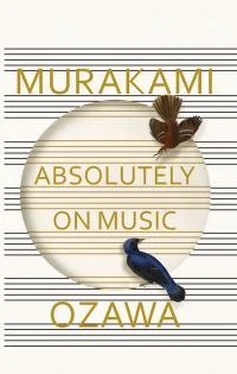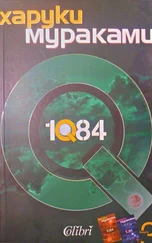MURAKAMI: Maybe American listeners preferred that—a forceful, deadish kind of sound.
Gould’s piano enters (3:31).
OZAWA: This is two years later than the other one?
MURAKAMI: It’s three years before the fuss over the Brahms, two years after the performance with Karajan. What a contrast with the Karajan!
OZAWA: Yes, this one is much more Glenn-style. A lot more relaxed. But to tell you the truth … hmmm … I wonder if it’s okay for me to say this … I really shouldn’t start comparing Karajan and Bernstein. I’m thinking of the word “direction”—the direction of the music. In Maestro Karajan’s case, he had it from birth—the ability to make long phrases. It was something he taught us, the ones who studied with him. Lenny was more what you’d call a genius. He had an instinctive ability to make long phrases, but he couldn’t do it consciously, intentionally. In Maestro Karajan’s case, he would set his desires in motion by sheer force of will—in Beethoven, say, or Brahms. So when Karajan was conducting a Brahms, for example, his will had this overwhelming strength. And he would give it priority even if that meant sacrificing details of the ensemble. He demanded the same thing from us disciples.
MURAKAMI: Sacrificing details of the ensemble …
OZAWA: Meaning if the specific details didn’t all work together, you didn’t let it worry you. The most important thing was to maintain this long, bold line. In other words, “direction.” In music, direction involves elements of linking. You have detailed direction and long direction.
The orchestra plays an ascending three-note figure behind the piano.
OZAWA: These three notes are a case of direction, too: “La, la, la.” Some people can make them as they go along and some people can’t, these parts that flesh out the music.
MURAKAMI: So in Bernstein’s case, regarding what you call “direction,” it’s not so much mental calculation as instinct, something almost physical.
OZAWA: Something like that, I suppose.
MURAKAMI: And when he does it well, it’s fine, but when he doesn’t, things can come apart.
OZAWA: Right. By contrast, Maestro Karajan sets up the direction clearly beforehand, and he clearly demands it from the orchestra.
MURAKAMI: The music has already formed inside him before the performance.
OZAWA: Pretty much.
MURAKAMI: But Bernstein’s not like that.
OZAWA: Maybe not. He’s doing it more on the spot, instinctively.
The recording continues. Gould takes a relaxed approach with the solo (4:33-5:23).
OZAWA: Here, Glenn is being truly free with the music.
MURAKAMI: You mean, compared with the Karajan performance we just heard, Bernstein lets his soloist play more freely—and to some extent he makes his music conform to the flow of the piano? Is that it?
OZAWA: There is some of that, I’d say—in this piece, at least. But with the Brahms, it’s not so easy to do, so they had that problem we talked about—especially with that particular piece, the First Piano Concerto.
In the solo, Gould slows his phrasing way down and draws it out (5:01– 5:07).
OZAWA: Now that’s Glenn Gould, where he slo-o-o-ws it down like that.
MURAKAMI: He changes the rhythm so freely. That’s his style—if he were a writer, I might say it’s the way he delivers his sentences. It must be hard to accompany.
OZAWA: Yes, of course it’s hard.
MURAKAMI: So in rehearsal, that means you have to understand his breathing and try to match it?
OZAWA: Well, yes, but when you’re dealing with musicians of this caliber, they can do it in the actual performance, too. Both sides carefully calculate their moves, though it’s not so much a question of calculation as it is of trust. I tend to be on the receiving end of that trust—they take me too seriously. [ Laughs. ] So, often, soloists will do anything they like with me. [ Laughs. ] When a performance like that goes well, though, it’s fantastic. The music sounds so free.
The piano plays a descending passage, at the end of which the orchestra enters (7:07– 7:11).
OZAWA: Did you notice that? Near the end of the descending passage, just before the orchestra entered, Glenn added a kind of pon! sound to the note [ 7:10 ].
MURAKAMI: Added?
OZAWA: Sending a signal to the conductor, saying, “Come in here. ” An accent that is not in the written score. It’s just not there.
The piano begins the famous long cadenza near the end of the first movement (13:06).
OZAWA: He’s down low, on that low chair of his, playing like this. [ He sinks down in his chair. ] I’m not sure what that’s all about.
MURAKAMI: Was Gould already popular back then?
OZAWA: Yes, he was. I was thrilled the first time I met him, of course. But he wouldn’t shake hands. He always had gloves on.
MURAKAMI: He was a real eccentric, I guess.
OZAWA: I heard all kinds of weird stories about him when I was music director of the Toronto Symphony Orchestra [from 1965 to 1969]. He invited me to his house, too …
Murakami note: Unfortunately, some of the anecdotes revealed at this point cannot be committed to print.
Final part of the cadenza. The pacing of the notes undergoes dizzying change.
MURAKAMI: His interpretation here is absolutely free, isn’t it?
OZAWA: Pure genius. Utterly convincing. But it’s very different from the score. Still, it doesn’t sound at all strange.
MURAKAMI: When you say things are not in the score, you don’t mean just in the cadenza or other solo parts, do you?
OZAWA: No, not just there. That’s what’s so great about this.
The first movement ends (17:11). I lift the needle.
MURAKAMI: You know, I first heard this Gould and Bernstein recording when I was in high school, and ever since then, this version of the C Minor Concerto has been one of my favorites. I like the first movement, of course, but in the second movement there’s that wonderful part where Gould backs up the orchestra with arpeggios.
OZAWA: You mean, where the woodwinds are playing …
MURAKAMI: Right, right. An ordinary pianist would make it sound like a straightforward accompaniment, but with Gould you get the feeling that he’s playing in direct counterpoint with the orchestra. I’ve always liked that part for some reason. It’s totally different from other pianists’ performances.
OZAWA: He would have to be overwhelmingly self-confident to do something like that. Let’s listen to it. It just so happens I’m working on this piece now. I’m going to be playing it soon with Mitsuko Uchida. In New York. With the Saito Kinen Orchestra.
MURAKAMI: I’m looking forward to that. I wonder how that performance will go.
I turn the record over and start the second movement, but first we take a short break to drink hot hōjicha tea and eat rice cakes.
MURAKAMI: I would guess that this second movement is difficult to conduct.
OZAWA: It is!
MURAKAMI: I mean, it’s so slow! It’s beautiful, though. The piano plays solo. The orchestra enters quietly (1:19).
MURAKAMI: The orchestra’s sound is a lot less hard than it was in the first movement.
OZAWA: Yes, it’s much better.
MURAKAMI: Maybe they were tense before?
OZAWA: Maybe.
MURAKAMI: The first movement has a real tension running through it. At first it sounded as if there was maybe a duel going on between the soloist and the conductor. Judging from various performances, there seem to be two distinct approaches to the first movement: a confrontational mode and a collaborative mode. Take the 1944 live recording of Rubinstein and Toscanini—it sounds as if the two are fighting. Have you heard it?
Читать дальше











